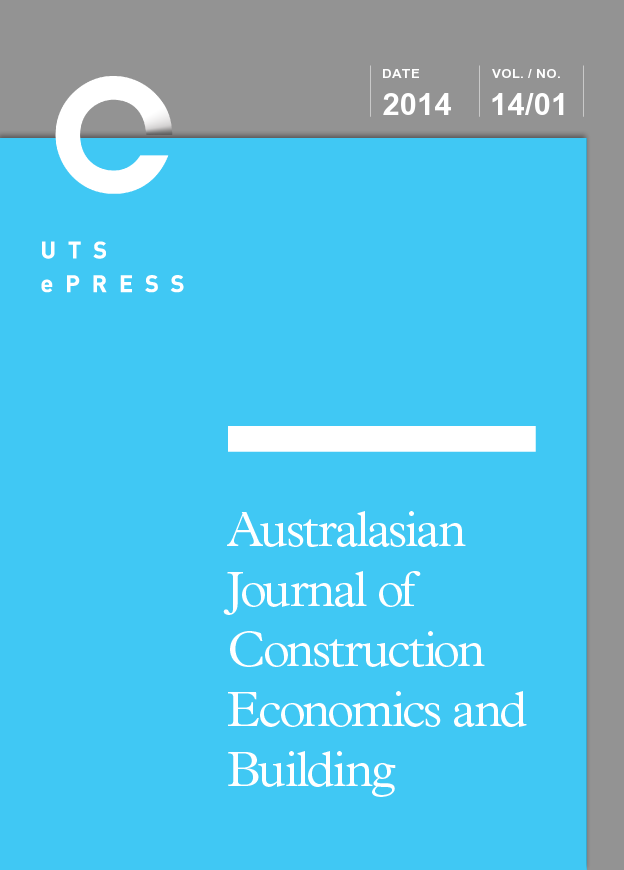Factors influencing decisions on delay claims in construction contracts for Indian scenario
Main Article Content
Abstract
Construction industry in India is second largest next to agriculture. In current era of infrastructure development construction projects occupy a key position. In any construction project contract time and cost overrun is a common feature, which gives rise to claims leading to disputes. These disputes if not handled properly tend to consume time and money of all parties to the contract. To resolve the dispute in optimum time, it is essential to understand the root cause of disputes as early as possible. Hence there is a need of analyzing the disputes scientifically. The present study reveals from the study of arbitration awards that the causes for delay claims can be grouped in domains and the probable decisions to the disputes can be traced through the probing questions considered by decision makers. This paper attempts to identify questions related to disputes for Indian scenario through literature, arbitration awards, court cases and discussions with professionals.
Article Details
Section
Authors who publish with this journal agree to the following terms:
a) Authors retain copyright and grant the journal right of first publication with the work simultaneously licensed under a Creative Commons Attribution License that allows others to share and adapt the work with an acknowledgement of the work's authorship and initial publication in this journal.
b) Authors are able to enter into separate, additional contractual arrangements for the non-exclusive distribution of the journal's published version of the work (e.g., post it to an institutional repository or publish it in a book), with an acknowledgement of its initial publication in this journal.
c) Authors are permitted and encouraged to post their work online (e.g., in institutional repositories or on their website) prior to and during the submission process, as it can lead to productive exchanges, as well as earlier and greater citation of published work (See The Open Access Citation Advantage Service). Where authors include such a work in an institutional repository or on their website (ie. a copy of a work which has been published in a UTS ePRESS journal, or a pre-print or post-print version of that work), we request that they include a statement that acknowledges the UTS ePRESS publication including the name of the journal, the volume number and a web-link to the journal item.
d) Authors should be aware that the Creative Commons Attribution (CC-BY) License permits readers to share (copy and redistribute the work in any medium or format) and adapt (remix, transform, and build upon the work) for any purpose, even commercially, provided they also give appropriate credit to the work, provide a link to the license, and indicate if changes were made. They may do these things in any reasonable manner, but not in any way that suggests you or your publisher endorses their use.
How to Cite
References
Aibinu, A.A., and Jagboro, G.O. (2002) 'The effects of construction delays on project delivery in Nigerian construction industry', International Journal of Project Management, 20, 593-599. http://dx.doi.org/10.1016/S0263-7863(02)00028-5
Al-Momani, A.H. (2000) 'Construction delay: a quantitative analysis', International Journal of Project Management, 18, 51-59. http://dx.doi.org/10.1016/S0263-7863(98)00060-X
Iyer, K.C. and Kalidindi, N.S. (2002) 'Final and Binding Power Clauses in Indian Construction Contracts', International Journal of Project Management, 20, 13-22. http://dx.doi.org/10.1016/S0263-7863(00)00028-4
Iyer, K.C., Kalidindi, N.S. and Ganesh, L.S. (2001) 'Effects of Construction Contract clauses on occurrence of disputes in India', Asia Pacific Building and Construction Management Journal, 6 (1), 13-24.
Kumarswamy, M.M., andYogeswaran, K. (2003) 'Substantiation and assessment of claims for extension of time', International Journal of Project Management, 21, 27-38. http://dx.doi.org/10.1016/S0263-7863(01)00052-7
Odeh, A.M., and Battaineh, H.T. (2002) 'Causes of construction delay: traditional contracts', International Journal of Project Management, 20, 67-73. http://dx.doi.org/10.1016/S0263-7863(00)00037-5
Satyanarayana, K.N. and Iyer, K.C. (1996) 'Evaluation of delays in Indian construction contracts', Journal of the Institution of Engineers (India), Vol.77, September 1996, 14-22.
Scott, S. (1997) 'Delay Claims in U.K. Contracts', Journal of Construction Engineering and Management, ASCE, 123 (3), 238-244. http://dx.doi.org/10.1061/(ASCE)0733-9364(1997)123:3(238)
Scott, S., Harris, R.A., and Greenwood, D. (2004) 'Assessing the New United Kingdom Protocol for Dealing with Delay and Disruption', Journal of Professional Issues in Engineering Education and Practice, ASCE, 130 (1), 50-59. http://dx.doi.org/10.1061/(ASCE)1052-3928(2004)130:1(50)
Yates, J.K. and Epstein, A. (2006) 'Avoiding and Minimizing Construction Delay Claim Disputes in Relational Contracting', Journal of Professional Issues in Engineering Education and Practice, ASCE, 132 (2), 168-179. http://dx.doi.org/10.1061/(ASCE)1052-3928(2006)132:2(168)
